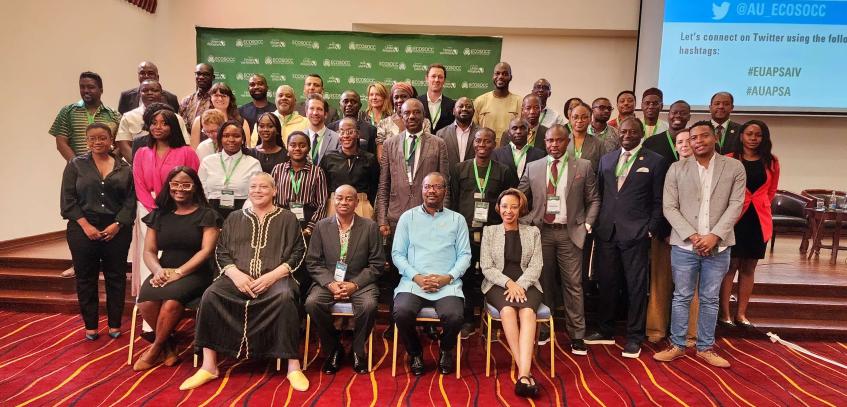The African Union Economic Cultural and Social Council (AU-ECOSOCC)’s two-day consultative workshop to develop a consolidated database of Civil Society Organizations (CSOs) in the fields on peace and security has kicked off on 21 April 2023, in Nairobi, Kenya.
The database on governance, peace, and security issues is part of ECOSOCC's ongoing efforts to promote and strengthen African civil society's institutional, human and operational capacities. The consultative workshop featured the ECOSOCC Peace and Security Cluster, the African Union Peace and Security Council (PSC), RECs/RMs and peace and security CSOs on the continent to define and develop a roadmap that will inform the development of the database.
Opening the workshop, H.E. George Kwanya, Deputy Ambassador of the Republic of Kenya to Ethiopia and Permanent Representative to the African Union, expressed his hope that the workshop would enable the various stakeholders to exchange ideas and find new ways to achieve peace and stability on the continent.
H.E. Deputy Ambassador Kwanya pointed to existing frameworks that guide civil society engagement with the African Union on peace and security matters, in particular, the Livingstone Formula.
Article 8, sub-articles 10, 11, and 20 of the Peace and Security Council (PSC) Protocol, as well as the Livingstone Formula and the Maseru Conclusions, all of which are important components of AU Agenda 2063's Aspiration 4, which envisions a peaceful and fully functional and operational African Peace and Security Architecture (APSA), guide ECOSOCC's initiative to strengthen CSO capacity in these areas.
The launch of the fourth European Support Programme for the African Peace and Security Architecture (EU APSA IV) in March 2020 accelerated the drive for effective coordination and partnership at all levels within the APSA (including with CSOs), and engagement with and inclusion of youth and children in addressing APSA aspects.
In line with the Maseru Conclusion of 2014 which requires CSOs to comply with the ECOSOCC criteria for membership and interaction with the PSC, to allow for a more robust engagement of the PSC and CSOs, ECOSOCC seeks to develop a functional and harmonized CSO database for engagement in the APSA framework including interaction with the PSC.
Mr. Khalid Boudali, ECOSOCC’s Presiding Officer said, “through our deliberations today, we hope to identify the essential components of the consolidated database, which will serve as a reservoir of civil society organizations actively involved in maintaining peace and security in Africa. Furthermore, we endeavor to determine the extent of its reach and chart a roadmap that is both effective and impactful, providing guidance in ensuring that the database is comprehensive, relevant, and accessible to its relevant stakeholders.”
From the CSO perspective, “one of the most pressing challenges facing CSOs in Africa is the lack of reliable and up-to-date information about the sector. Without accurate data on the scope and scale of CSO activities, it is challenging to design effective policies, allocate resources, or coordinate efforts to address the complex challenges of peace and security on the continent,” explained Mr. William Carew, Head of ECOSOCC Secretariat.
Mr. Carew further explained that the database would provide a platform for CSOs to collaborate and coordinate their efforts, share information and best practices, and promote accountability and transparency. It would also serve as a resource for governments, donors, and other stakeholders to engage with CSOs and support their efforts.
Ms. Elizabeth Mutunga, Head of Governance, Peace and Security, Common Market for Eastern and Southern Africa (COMESA) explained the need for the CSO database. She said that mediators rely on civil society to assist with negotiations and to build consensus around peace. However, locating relevant or specific CSOs to work with the PSC and other AU organs remained a challenge, yet was one of the most important factors of success in accomplishing peace and security initiatives.
CSOs shared their experiences in engaging with the PSC and highlighted lessons learned, opportunities and challenges in an interactive roundtable session led by Mr. Jonathan Sandy, Chair of the ECOSOCC Peace and Security Cluster.
Another roundtable deliberation shed light on the significance and utilization of the CSO database in fostering peace and security across Africa and its implications for future engagements of African CSOs within the APSA; and solicited inputs from the key stakeholders.
The insights and feedback garnered from the roundtable deliberations served as the foundation for crafting a roadmap and a set of Standard Operating Procedures (SOPs) to steer the development of the CSO database.
As Mr. Kyeretwie Osei, Head of Programs at ECOSOCC, noted, the consolidated CSO database would be “an acting and living database of CSOs that the African Union and its Member States can rely on.”





